Unit3-4单元总结
人教版英语八年级下册单元知识点总结及同步练习 Unit3--4单元(无答案)
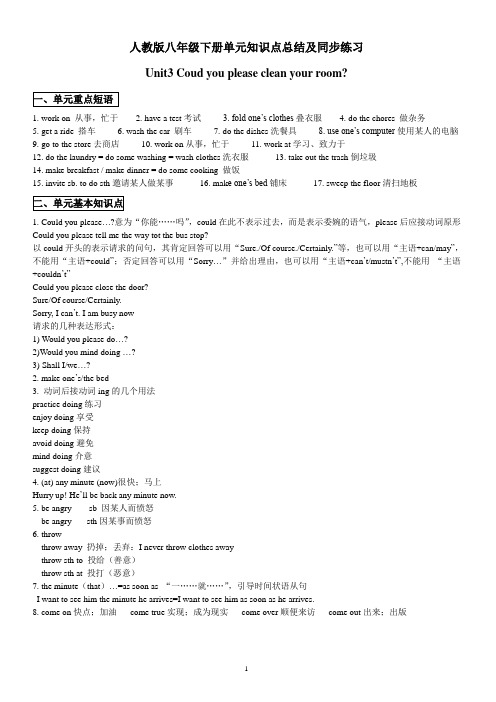
人教版八年级下册单元知识点总结及同步练习Unit3 Coud you please clean your room?1. work on 从事,忙于2. have a test考试3. fold one’s clothes叠衣服4. do the chores 做杂务5. get a ride 搭车6. wash the car 刷车7. do the dishes洗餐具8. use one’s computer使用某人的电脑9. go to the store去商店10. work on从事,忙于11. work at学习、致力于12. do the laundry = do some washing = wash clothes洗衣服13. take out the trash倒垃圾14. make breakfast / make dinner = do some cooking 做饭15. invite sb. to do sth邀请某人做某事16. mak e one’s bed铺床17. sweep the floor清扫地板1. Could you please…?意为“你能……吗”,could在此不表示过去,而是表示委婉的语气,please后应接动词原形Could you please tell me the way tot the bus stop?以could开头的表示请求的问句,其肯定回答可以用“Sure./Of course./Certainly.”等,也可以用“主语+can/may”,不能用“主语+could”;否定回答可以用“Sorry…”并给出理由,也可以用“主语+can’t/mustn’t”,不能用“主语+couldn’t”Could you please close the door?Sure/Of course/Certainly.Sorry, I can’t. I am busy now请求的几种表达形式:1) Would you please do…?2)Would you mind doing …?3) Shall I/we…?2. make one’s/the bed_________________3. 动词后接动词ing的几个用法practice doing练习enjoy doing享受keep doing保持avoid doing避免mind doing介意suggest doing建议4. (at) any minute (now)很快;马上Hurry up! He’ll be back any minute now.5. be angry ___ sb 因某人而愤怒be angry ___sth因某事而愤怒6. throwthrow away 扔掉;丢弃:I never throw clothes awaythrow sth to 投给(善意)throw sth at 投打(恶意)7. the minute(that)…=as soon as “一……就……”,引导时间状语从句I want to see him the minute he arrives=I want to see him as soon as he arrives.8. come on快点;加油come true实现;成为现实come over顺便来访come out出来;出版9. reply to sb/sth对某人/某物做出回答或反应10. all the time频繁;反复, 常常位于句末,强调在某段时间内一直进行或发生某事I have a dog and a cat, but they fight all the time.11. as…as…像……一样……表示两者在某方面程度相同,第一个as是副词,后应该跟形容词或副词的原级,第二个as是介词,后可跟名词,代词拓展:as…as…的否定形式是not as/so…as…“不如……;不与……一样”He studies as hard as his bother.He doesn’t study as/so hard as his brother12. neither1)neither did I 是“neither+be动词/助动词/情态动词+主语”结构,表示前者的否定情况也适用于后者。
2022年人教版七年级上册unit3---4单元复习知识点总结
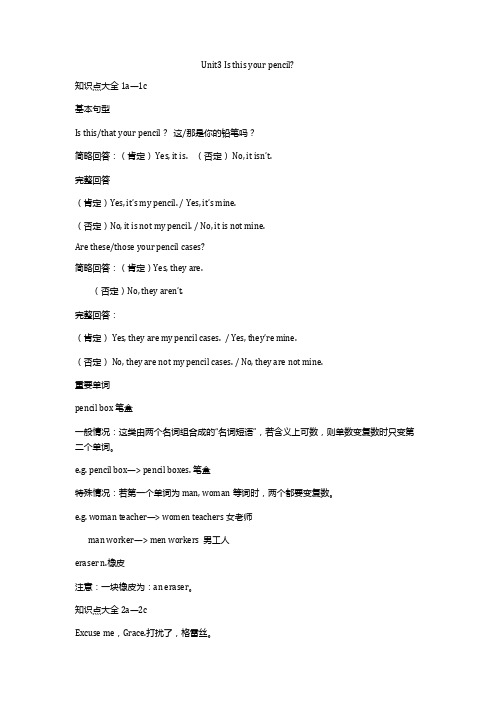
Unit3 Is this your pencil?知识点大全1a—1c基本句型Is this/that your pencil?这/那是你的铅笔吗?简略回答:(肯定) Yes, it is. (否定)No, it isn’t.完整回答(肯定)Yes, it’s my pencil. / Yes, it’s mine.(否定)No, it is not my pencil. / No, it is not mine.Are these/those your pencil cases?简略回答:(肯定)Yes, they are.(否定)No, they aren’t.完整回答:(肯定)Yes, they are my pencil cases. / Yes, they’re mine.(否定) No, they are not my pencil cases. / No, they are not mine.重要单词pencil box 笔盒一般情况:这类由两个名词组合成的“名词短语”,若含义上可数,则单数变复数时只变第二个单词。
e.g. pencil box—> pencil boxes. 笔盒特殊情况:若第一个单词为man, woman等词时,两个都要变复数。
e.g. woman teacher—> women teachers 女老师man worker—> men workers 男工人eraser n.橡皮注意:一块橡皮为:an eraser。
知识点大全2a—2cExcuse me,Grace.打扰了,格雷丝。
本句是向别人提出请求、询问事情或打扰别人时常用的交际用语。
e.g.Excuse me. How can I get to the hospital?请问,我可以怎么去医院呢?Excuse me. Is this your book?打扰了,这是你的书吗?补充:excuse me 与sorry的区别sorry一般用于对事后所犯的错误或者是不能满足对方的要求,不能帮助对方时表示歉意,常表示“对不起,不好意思”。
人教新目标高中英语必修四Unit3单元知识点归纳总结
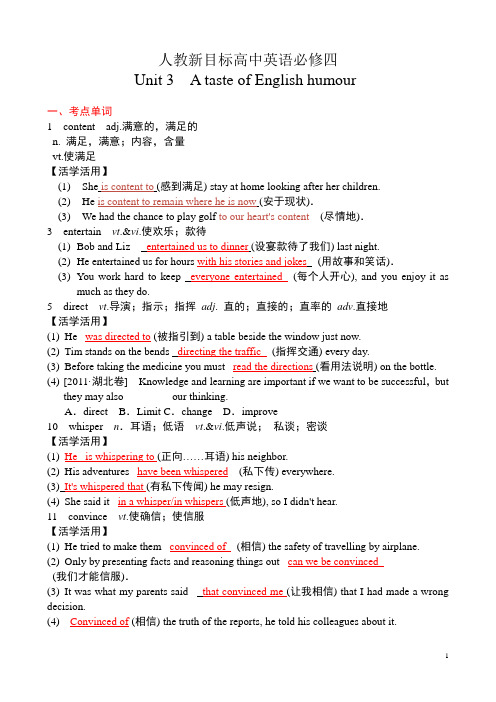
人教新目标高中英语必修四Unit 3 A taste of English humour一、考点单词1content adj.满意的,满足的n. 满足,满意;内容,含量vt.使满足【活学活用】(1) She is content to (感到满足) stay at home looking after her children.(2) He is content to remain where he is now (安于现状).(3) We had the chance to play golf to our heart's content _ (尽情地).3entertain vt.&vi.使欢乐;款待(1) Bob and Liz entertained us to dinner (设宴款待了我们) last night.(2) He entertained us for hours with his stories and jokes(用故事和笑话).(3) You work hard to keep _everyone entertained (每个人开心), and you enjoy it asmuch as they do.5direct vt.导演;指示;指挥adj. 直的;直接的;直率的adv.直接地【活学活用】(1) He _was directed to (被指引到) a table beside the window just now.(2) Tim stands on the bends _directing the traffic (指挥交通) every day.(3) Before taking the medicine you must _read the directions (看用法说明) on the bottle.(4) [2011·湖北卷] Knowledge and learning are important if we want to be successful,butthey may also ________ our thinking.A.direct B.Limit C.change D.improve10whisper n.耳语;低语vt.&vi.低声说;私谈;密谈【活学活用】(1) He _is whispering to (正向……耳语) his neighbor.(2) His adventures _have been whispered (私下传) everywhere.(3) It's whispered that (有私下传闻) he may resign.(4) She said it _in a whisper/in whispers (低声地), so I didn't hear.11convince vt.使确信;使信服【活学活用】(1) He tried to make them _convinced of (相信) the safety of travelling by airplane.(2) Only by presenting facts and reasoning things out _can we be convinced(我们才能信服).(3) It was what my parents said __that convinced me (让我相信) that I had made a wrong decision.(4) _Convinced of (相信) the truth of the reports, he told his colleagues about it.二、考点短语1badly off穷的;缺少的(比较级worse off, 最高级worst off)【活学活用】(1) Though he is always wearing old clothes, he is _not as/so badly off (并不是那么穷) as you think.(2) In fact most people are _better off (更富裕) than they were five yeas ago.3pick out(to choose or select)挑出;(distinguish)辨别出;领会(1) She __was/is picked out from thousands of applicants for the job.(2) We'll _pick up where we finished yesterday.(3) She soon _picked up French when she went to live in France.(4) Pick out those books that you'd like to read.4cut off(to shut off)切断(水、电、煤气等)供应;断绝用cut相关短语的适当形式完成句子(1) I was speaking to Ann on the phone when suddenly we were _cut off(2) The ship cut her way through the wave.(3) Cutting down costs is a good way to make profits.(4) Don't hesitate to cut out the useless information in your passage.三、考点句式1.(现在分词作结果状语常表示“意料、情理之中”,而不定式作结果状语常表出乎意料的结果)(1)She fell off the bike, breaking her left leg.(break)她从自行车上摔了下来,摔断了左腿(2)The old scientist died, leaving the project unfinished.(leave)那位老科学家去世了,留下了未完成的项目。
初三英语复习 unit3-4 review 单元重点词组语法汇总
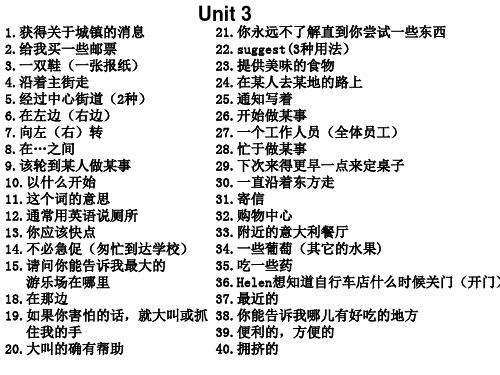
1.这是谁的排球? 这个排球属于谁? 2.喜欢兔子 3.他是野餐的时候惟一带帽子的男孩。 4.---这个发夹是谁的? ---它有可能是Mei的。或者它有可能 属 于 Linda.他们都有长头发。 5.你能告诉我我的自行车怎么了? 6.参加演唱会 7.一些贵重的东西 8.其余我的朋友 9.打电话个某人 10.每个人都有自己的想法。 11.没有什么曾经发生在这周围。 12.一件不同寻常的事情 13.奇怪的噪音(如此多的噪音) 14.我也不能看见其他的任何东西。 15.感到不安 16.在我们小区肯定有某个东西闯入我 们 家中。
32.许多年来,历史学家认为巨石 45.一个墓地 阵是一座古代领导人试图与神灵 46.一个尊敬祖先的地方 沟通的寺庙。 47.庆祝战胜敌人 33.许多世纪之前 48.很长的时期 34.达到 49.我们真的不知道谁建造了巨石阵。 35.指出 50.他们一定很勤奋。 36.一种日历 51.伟大的规划者 37.这些巨石以一种特定的方式被 52.没有那样的东西 放置在一起。 53.等待某人做某事 38.在盛夏的早晨,太阳直接照射 54.她是唯一穿那种色彩艳丽的衣服的 在石头的中心。 人. 39.一种医学目的 55.在电话里和谁聊天 40.预防疾病 56.在上班 41.使人们保持健康 57.谜团解开了 42.当你走到那儿时,你可以感觉 58.那道明亮的光 到能量从你的脚上传到你的身体。 59.给出一个选择 43.没有人确定巨石阵被用来干什么 60.表达一个结果 44.一种特殊的目的
Until 7
1.刚刚获得驾照 2.十六岁的青少年应该被允许打耳洞 3.担心你的安全 4.做兼职工作 5.选择自己的衣服 6.不够谨慎 7.太小而不能自己做决定 8.戒烟 9.Stop用法 10.戴耳环 11.剪头发 12.和朋友度过时光 13.需要时间做某事 14.对什么感到兴奋 15.选择某事 16.照很多照片 17.带来相机 18.保护油画 19.如果我们不用闪光灯的话,我们可能 被允许照相 20.无论如何,反正,尽管如此
新目标八年级英语上册第三单元知识点总结(Unit4Howdoyougettoschool?)

新目标八年级英语上册第三单元知识点总结(Unit 4 How doyou get to school? )Unit 4 How do you get to school?一.短语归纳1. take the subway to … = go to … by subway 搭地铁2. take the train to … = go to … by train 坐火车3. take a bus to … = go to …by bus = go to … on a bus 乘坐公共汽车4. take a taxi to … = go to … by taxi 坐的士5. ride a bike/ bicycle to… = go to … by bike/ bicycle 骑自行车6. walk to… = go to … on foot 步行7. take a car to… = go to … in a car= go to … by car 坐汽车8. get to school 到达学校get to=arrive in/at=reach 到达 (in加大地方at加小地方)9. 10 kilometers from school 离学校10公里(远)10. from…to… 从…到… from his home to school 从他家到学校11. how (用于提问状态和交通工具)怎样how long 用来询问时间的长度(用于提问时间段多长(时间))或物体的长度how often (用于提问频率)多久时间一次how far (用于提问距离)多远how many 用于提问数量)多少how much(用于提问数量/价钱)多少/多少钱how soon“过多久”,用来询问某事要在多久以后才能发生12. have a quick breakfast 快速地吃早餐13. leave for school 出发去学校14. the early bus 早班车15. take sb. to school 带某人去学校Then the early bus takes him to school.然后,他乘坐早班车到学校16. bus ride 搭公车的路程17. bus stop 公车亭18. bus station 公车站bus stop 是指小站,bus station指大的站,比如汽车站。
三年级英语上学期Unit3-4单元知识梳理(冀教版三起)

第三单元重点总结一.单词:*Fee l ings感觉:cold冷hot 热tired 疲倦的,累的happy 高兴的,幸福的sad悲伤的warm温暖的,暖和的cool 凉爽的,酷的*Body身体部位:head头arm胳膊hand手leg腿foot脚(复数feet) hair头发eye眼睛nose鼻子ear耳朵mouth嘴face脸shoulder肩膀stomach胃finger手指knee膝盖*动词:(熟记)touch 触摸clap 拍手stamp 跺脚wave 挥动shake 摇动walk走;步行*其他:left左边right右边doctor医生sick生病的hurt疼,受伤matter问题,事情(熟记) tail尾巴二.句型:1.询问感觉/他人健康状况(日常问候语):--How do you feel? 你感觉怎么样?--I feel _happy_. 我感觉... = I’m ____. = I am____.2.询问事物问答句:--What is it? 它是什么?--It is ____. 它是...3.T ouch your _____. 摸摸你的...4.c lap your hands 拍拍你的手stamp my foot 跺跺我的脚wave my arm 挥挥我的胳膊shake your leg 摇晃你的腿5.S how me your left _hand_. 向我展示你的左手。
Show me your right _____. 向我展示你的右...6.介绍人或物;描述事物特点句型:This is _____. 这是...That is _____.=That’s _____. 那是...(填hot/cold/warm/cool)7.询问别人健康状况(日常问候语):--Are you okay? 你还好吗?--No, I’m sick. 不,我生病了。
/ I’m fine. 我很好。
人教版中考英语一轮复习八年级上册Units3-4单元+短语汇总及比较级最高级
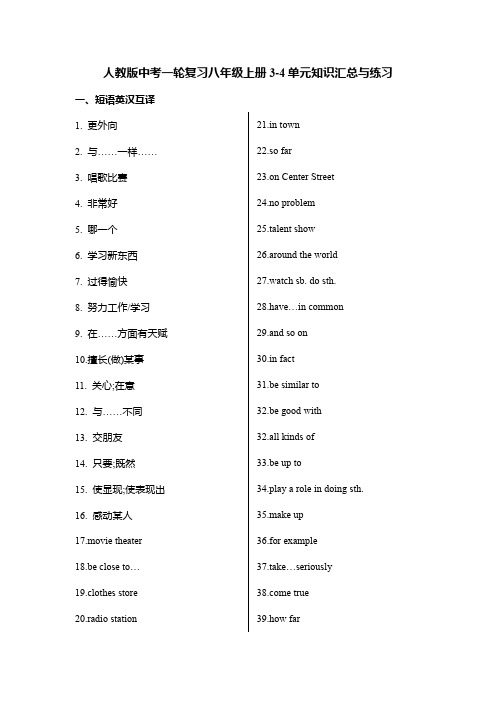
人教版中考一轮复习八年级上册3-4单元知识汇总与练习一、短语英汉互译1. 更外向2. 与……一样……3. 唱歌比赛4. 非常好5. 哪一个6. 学习新东西7. 过得愉快8. 努力工作/学习9. 在……方面有天赋10.擅长(做)某事11. 关心;在意12. 与……不同13. 交朋友14. 只要;既然15. 使显现;使表现出16. 感动某人17.movie theater18.be close to…19.clothes store20.radio station 21.in town22.so far23.on Center Street24.no problem25.talent show26.around the world27.watch sb. do sth.28.have…in common29.and so on30.in fact31.be similar to32.be good with32.all kinds of33.be up to34.play a role in doing sth.35.make up36.for example37.take…seriouslye true39.how far二、形容词副词原级比较级最高级1.serious more serious most serious2.outgoing more outgoing most outgoing3.clearly more clearly most clearly4.close closer closestfortable more comfortable most comfortable6.creative more creative most creative7.crowded more crowded most crowded8.beautifully more beautifully most beautifully练习一、单项选择1.What do you ____ this new watch?A.think at B.think of C.think over D.think hard 2.—How often do you chat online at home?—________. I don't think it's good for me.A.Always B.Usually C.Sometimes D.Hardly ever 3.My father is ________ of my parents, but I am ________ in my family.A.heavier; the heaviest B.more heavy; most heavy C.the heavier; the heaviest D.the most heavy; heaviest 4.May I have a talk with you? I have _______ to tell you.A.nothing important B.anything importantC.something important D.important something 5.—Who is the_____________ runner, Mike or Sam?—Mike is. He is good at running.A.faster B.slower C.weaker 6.Which would you like ________, basketball or football?A.good B.better C.best D.well7.Amy makes ________ mistakes than Frank. She does her homework ________. A.less; more carelessly B.fewer; more carelesslyC.less; more carefully D.fewer; more carefully8.He always finished his work better with ________ money and ________ people. A.less; fewer B.fewer; less C.little; less D.less; few9.________ friends you have, ________ you will be.A.More;happier B.The more;the happyC.More;more happy D.The more;the happier10.The less junk food you eat, _______ you will be.A.the healthier B.healthier C.more healthy二、根据短文内容及所给提示,在文中的空白处写出单词的正确形式。
【三升四】 人教PEP 三下英语复习Unit 3--4(梳理+基础卷+提高卷)(含答案)

名校暑假培优人教PEP三升四复习三下Unit 3—4知识梳理Unit3At the zoo一、词汇thin 瘦的fat 胖的;肥的tall 高的short 矮的;短的long 长的small 小的big 大的giraffe 长颈鹿so 这么;那么children (child的复数)儿童tail 尾巴二、句子1. Look at the elephant. 看这头大象。
2. It has a long nose. 它有长鼻子。
3. Look at that monkey. It’s so fat! 看那只猴子。
它好胖啊!4. Look at the giraffe. 看这只长颈鹿。
5. It’s so tall! 它好高啊!6. It’s short and fat! 他又矮又胖!7. It has a short tail. 它有短尾巴。
8. It has small eyes and big ears. 它有小眼睛和大耳朵。
9. It has a small head! 它有小头!三、句型结构1. It’s (so) +描述外形特征的形容词.e.g.: It’s so small. 它太小了。
2. It has+描述外形特征的短语.e.g.: It has a long body and short legs. 它有长身体和短腿。
Unit4Where is my cat?一、词汇on 在……上in 在……里under 在……下面chair 椅子desk 书桌cap 帽子ball 球car 小汽车 boat 小船map 地图toy 玩具box 盒;箱二、句子1. Where is my car? 我的小汽车在哪里?2. -- Where is my pencil box? 我的铅笔盒在哪里? -- It’s in your desk. 它在你的书桌里。
3. It’s under your book! 它在你的书下面!4. -- Where is the ruler? 尺子在哪里?-- It’s under the chair! 它在椅子下面!5. Where is my cap? 我的帽子在哪里?6. -- Is it in your bag? 它在你的包里吗?-- No, it isn’t. 不,它不在。
- 1、下载文档前请自行甄别文档内容的完整性,平台不提供额外的编辑、内容补充、找答案等附加服务。
- 2、"仅部分预览"的文档,不可在线预览部分如存在完整性等问题,可反馈申请退款(可完整预览的文档不适用该条件!)。
- 3、如文档侵犯您的权益,请联系客服反馈,我们会尽快为您处理(人工客服工作时间:9:00-18:30)。
Unit3-4 总结【句型】1.①like/love/enjoy/be fond of doing 喜欢做某事。
(enjoy s/enjoy ed)hate doing sth. 讨厌做某事。
(比较:feel like doing sth. = would like to do sth. 想要做某事。
)②be interested in doing sth. 对做某事感兴趣。
(interesting 有趣的interest 兴趣n.)③prefer doing sth. to doing sth. 比起……更喜欢……(to表介词的标志) (prefer s/prefer red)2.①sb. spend + 时间/钱+ (in) doing sth. 某人花多少时间/钱做某事。
(spen t)②It takes sb. + 时间+to do sth. 某人花多少时间做某事。
(t oo k)③It costs sb. +钱+ to do sth. 某人花多少钱做某事。
(cost)3. pay attention to doing 注意做某事。
(to表介词的标志)4.①find great pleasure (in)doing sth. 发现做某事有很大的乐趣。
②sb. have great fun doing sth. 做某事很愉快。
③It’s great fun (for sb.) to do sth. 做某事(对某人来说)有很大乐趣。
5. lose oneself in doing sth. 沉迷于做某事。
(lost)6.do some doing sth. e.g. do some shopping/ cleaning/ washing 购物/做卫生/洗衣服7.without doing sth. 没做某事without leaving your home/having breakfast/saying a word8.There be + n. + Ving9.would you mind (not)doing sth. 你介意(不)做某事吗?10.keep (sb.)doing sth. (让某人)保持做某事make sb. do sth 使某人做某事ask/tell/ advise/ order sb. to do sth.e d to do sth./ didn’t use to do sth. 过去常常做某事/过去不经常做某事use sth. to do sth. / for doing sth.. 用某物做某事(*比较:be use d to do sth. 被用于做某事be /get use d to do ing sth. 习惯做某事)12. order sb. (not) to do sth. 命令某人(不要)做某事13. continue doing/to do sth. 继续做某事(比较*go on doing sth. 继续做同一件事go on to do 继续去做另一件事)(*stop to do sth 停下来去做另一件事stop doing sth. 停止做某事)14. afford to do sth. 付得起做某事15. agree (sb.) to do sth. 同意(某人)做某事16. call sb. to do sth. 打电话叫某人做某事17.find/think it + adj. (for sb.) to do sth. 发现/认为做某事(对某人来说)是…….18.take the place of sb. to do sth. = do sth. instead of sb. 代替某人做某事instead of doing sth. 代替做某事19.how to do sth. 如何做某事20.teach sb. to do sth. 教某人做某事(taught)learn to do sth. 学做某事21.need sth. to do sth. 需要某物来做某事22.to do 表目的23.try to do sth. = try/ do one’s best to do sth. 尽力做某事try doing sth. 尝试做某事24. be sure to do sth. 确定做某事25. get to do sth.26. sb. be welcome to do 欢迎某人做某事27. I think + doing sth. + Vs …(动名词充当主语)【重点】(一)过去进行时1. 时间状语具体时间点/一段时间+过去时间(e.g. at that time/ at 7 o’clock yesterday/ from 3 o’clock to 5 o’clock lastnight/ at this time last Sunday)2. 构成:was/were (not)do ing疑问句:Was/were sb. doing sth.? ( I/ he / she/ it was we/you/they were)3. when & while(1)短暂性动词用一般现在时或一般过去式,延续性动词用现在进行时或过去进行时(常见短暂性动词:come, go, enter, get, arrive, leave, ring, knock, see, find, wake up ...)(2) while + 延续性动词(进行时态)(3) 主从句都是延续性动词只能用whileExercise:1.I _____________________(listen) to music at 7 o’clock last night. (was listen ing)2.They __________________(not study) at that time. (weren’t study ing)3._________you ___________(chat) on the Internet at this time yesterday? (Were, cha tting)4._________your sister ____________(fly) a kite from four to five last night? (Was, fly ing)5.His classmates ________________(dance) while he ______________(sing) at that time. ( were danc ing,was sing ing)6.Someone _____________________(plant) trees when I arrived.(was plant ing)7.While their son ______________(watch) TV, the telephone rang. (was watch ing)(二)感叹句1. How + adj. + (主语(代词/the + 名词)+谓语)!=What +adj+n. + (主语+谓语)!e.g. How interesting the book is! = What an interesting book it is! (an: exciting/ interesting a: useful)How lovely the boys are! = What lovely boys they are!How fine the weather is! = What fine weather it is!(U.C.: weather / music / luck / information / work / news/ food…) 注意:What a good job!/What hard work!2. How + adv. + (主语+V.)!How heav ily it is rain ing! How careful ly he is listen ing! How happ ily the boy lives!3. How + 句子!How time flies!Exercise:1)__________________beautiful the flowers are!2) ___________________exciting trip it is!3) ___________________happy he is !4) ___________________interesting book it is!5) ___________________fast they run!6) ___________________bad weather it is!( 1. How 2. What an 3. How 4. What an 5. How 6. What)(三)形容词的比较级和最高级1.构成1) +er/est:faster/ fastest taller/tallest smaller/smallest (fast er/fat ter/far ther)2) +r/st: braver/bravest nicer/nicest cuter/cutest3) 双写+er/est:bigger/biggest redder/reddest fatter/ fattest thinner/thinnest wetter/wettest hotter/hottest (背)4)辅音+y, 去y 改i+er/est:easier/easiest earl ier/earl iest happier/happiest healthier/ healthiest (背)heavier/heaviest lazier/laziest luckier/luckiest dirtier/dirtiest noisier/noisiest busier/busiestuglier/ugliest funnier/funniest5) 部分双音节和多音节:more/most useful more/most friendly more/most interesting (more –ing)more/most famous (背)more/most popular more/most beautiful more/most dangerous6) 不规则:good/well---better---best bad/ill---worse---worst many/much---more---mostlittle---less---least (注:less/least +u.c. fewer/fewest + pl.)far---farther/further/farthest/furthestold---older/elder/oldest/eldest (my elder sister/brother)2.标志1)①than (比较级) I am fatter than him.②of/among +对象,in/on +地点(最高级)Of all the flowers, roses are the most beautiful.Jim is the tallest in his class/of all the students.注:He is taller than any other boy/ the other boy s in his class.He is the taller of the two. (两者中进行比较用比较级,且此时的比较级要加the)2) ①……, A or B? (比较级) Who is lazier, Lucy or Lily?②……,A, B or C? (最高级)Who is the thi nn est, Lucy, Lily or Ann?3)even/much/a lot/ a little/far +比较级This question is much eas ier. He is much more popular.He feels even worse today. He is a little more famous.4) 比较级+and+比较级:“越来越”bigger and bigger/more and more poplar/less and less +u.c./ fewer and fewer + pl.5) The +比较级……, the +比较级……The_______ (much) you exercise, the ________ (health) you will be. (more/health ier) 注:先把名词改成形容词再改比较级* 6)one of + 最高级+pl. The Great Wall is one of the greatest wonders of the world.* 7) the +序数词+最高级The Yellow River is the second longest river in China. 第二长3. 注意1)The weather in Beijing is colder than that in Fuzhou in winter. (that 代替不可数名词或单数名词) The trees in the countryside are greener than those in the city. (those 代替名词复数)2)My hair is longer than her s. His bag is bigger than mine. (注意比较对象一致)(四) 反意疑问句: 陈述句/祈使句+ 助动词/情态动词+主语?(助动词:do/does/did/be/will).1.前肯后否,前否后肯。
